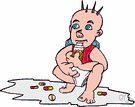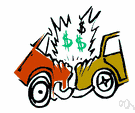harm
(redirected from harming)Also found in: Thesaurus, Idioms, Encyclopedia.
Related to harming: Self harming
harm
(härm)n.
1. Physical or psychological damage or injury: The storm did great harm to the crops.
2. Immoral or unjust effects: They made a mistake and meant no harm.
tr.v. harmed, harm·ing, harms
To do harm to: pollutants that harm the environment; people who were harmed in the accident.
[Middle English, from Old English hearm.]
American Heritage® Dictionary of the English Language, Fifth Edition. Copyright © 2016 by Houghton Mifflin Harcourt Publishing Company. Published by Houghton Mifflin Harcourt Publishing Company. All rights reserved.
harm
(hɑːm)n
1. physical or mental injury or damage
2. moral evil or wrongdoing
vb
(tr) to injure physically, morally, or mentally
[Old English hearm; related to Old Norse harmr grief, Old High German harm injury, Old Slavonic sramǔ disgrace]
ˈharmer n
Collins English Dictionary – Complete and Unabridged, 12th Edition 2014 © HarperCollins Publishers 1991, 1994, 1998, 2000, 2003, 2006, 2007, 2009, 2011, 2014
harm
(hɑrm)n.
1. injury or damage; hurt: to do someone bodily harm.
2. moral injury; evil; wrong.
v.t. 3. to do or cause harm to; injure; damage; hurt: to harm one's reputation.
Idioms: in or out of harm's way, in or out of a hazardous situation.
[before 900; Middle English; Old English hearm, c. Old Saxon, Old High German harm, Old Norse harmr]
harm′er, n.
Random House Kernerman Webster's College Dictionary, © 2010 K Dictionaries Ltd. Copyright 2005, 1997, 1991 by Random House, Inc. All rights reserved.
harm
Past participle: harmed
Gerund: harming
| Imperative |
|---|
| harm |
| harm |
Collins English Verb Tables © HarperCollins Publishers 2011
ThesaurusAntonymsRelated WordsSynonymsLegend:
Switch to new thesaurus
| Noun | 1. |  harm - any physical damage to the body caused by violence or accident or fracture etc. harm - any physical damage to the body caused by violence or accident or fracture etc.health problem, ill health, unhealthiness - a state in which you are unable to function normally and without pain brain damage - injury to the brain that impairs its functions (especially permanently); can be caused by trauma to the head, infection, hemorrhage, inadequate oxygen, genetic abnormality, etc. birth trauma - physical injury to an infant during the birth process blast trauma - injury caused the explosion of a bomb (especially in enclosed spaces) blunt trauma - injury incurred when the human body hits or is hit by a large outside object (as a car) bump - a lump on the body caused by a blow burn - an injury caused by exposure to heat or chemicals or radiation dislocation - a displacement of a part (especially a bone) from its normal position (as in the shoulder or the vertebral column) electric shock - trauma caused by the passage of electric current through the body (as from contact with high voltage lines or being struck by lightning); usually involves burns and abnormal heart rhythm and unconsciousness fracture, break - breaking of hard tissue such as bone; "it was a nasty fracture"; "the break seems to have been caused by a fall" cryopathy, frostbite - destruction of tissue by freezing and characterized by tingling, blistering and possibly gangrene intravasation - entry of foreign matter into a blood vessel penetrating injury, penetrating trauma - injury incurred when an object (as a knife or bullet or shrapnel) penetrates into the body pinch - an injury resulting from getting some body part squeezed rupture - state of being torn or burst open strain - injury to a muscle (often caused by overuse); results in swelling and pain whiplash, whiplash injury - an injury to the neck (the cervical vertebrae) resulting from rapid acceleration or deceleration (as in an automobile accident) wale, weal, welt, wheal - a raised mark on the skin (as produced by the blow of a whip); characteristic of many allergic reactions lesion - an injury to living tissue (especially an injury involving a cut or break in the skin) |
| 2. |  harm - the occurrence of a change for the worse harm - the occurrence of a change for the worsealteration, change, modification - an event that occurs when something passes from one state or phase to another; "the change was intended to increase sales"; "this storm is certainly a change for the worse"; "the neighborhood had undergone few modifications since his last visit years ago" deformation, distortion - a change for the worse | |
| 3. | harm - the act of damaging something or someone change of integrity - the act of changing the unity or wholeness of something impairment - damage that results in a reduction of strength or quality defacement, disfiguration, disfigurement - the act of damaging the appearance or surface of something; "the defacement of an Italian mosaic during the Turkish invasion"; "he objected to the dam's massive disfigurement of the landscape" wounding - the act of inflicting a wound burn - damage inflicted by fire | |
| Verb | 1. | harm - cause or do harm to; "These pills won't harm your system" injure - cause injuries or bodily harm to sicken - make sick or ill; "This kind of food sickens me" |
Based on WordNet 3.0, Farlex clipart collection. © 2003-2012 Princeton University, Farlex Inc.
harm
verb
noun
2. damage, loss, ill, hurt, misfortune, mischief, detriment, impairment, disservice It would probably do the economy more harm than good.
damage good, help, benefit, aid, gain, improvement, assistance, blessing, boon, reparation, help, better, benefit, aid, improve, repair, assist, alleviate
damage good, help, benefit, aid, gain, improvement, assistance, blessing, boon, reparation, help, better, benefit, aid, improve, repair, assist, alleviate
3. sin, wrong, evil, wickedness, immorality, iniquity, sinfulness, vice There was no harm in keeping the money.
sin good, goodness, righteousness
sin good, goodness, righteousness
in or out of harm's way in or out of danger, in or out of the firing line They were never told how they'd been put in harm's way.
Collins Thesaurus of the English Language – Complete and Unabridged 2nd Edition. 2002 © HarperCollins Publishers 1995, 2002
harm
nounverbThe American Heritage® Roget's Thesaurus. Copyright © 2013, 2014 by Houghton Mifflin Harcourt Publishing Company. Published by Houghton Mifflin Harcourt Publishing Company. All rights reserved.
TranslationsSelect a language:
Spanish / Español
harm
[hɑːm]A. N → daño m, mal m, perjuicio m
to do sb harm → hacer daño a algn (fig) → perjudicar a algn
it does more harm than good → es peor el remedio que la enfermedad
the harm is done now → el daño or mal ya está hecho
don't worry, no harm done → no te preocupes, no ha sido nada
there's no harm in trying → nada se pierde con probar
I see no harm in that → no veo nada en contra de eso
he means no harm → no tiene malas intenciones
out of harm's way → a salvo, fuera de peligro
to keep out of harm's way → evitar el peligro
we moved the car out of harm's way → quitamos el coche de en medio, movimos el coche a un lugar seguro
to do sb harm → hacer daño a algn (fig) → perjudicar a algn
it does more harm than good → es peor el remedio que la enfermedad
the harm is done now → el daño or mal ya está hecho
don't worry, no harm done → no te preocupes, no ha sido nada
there's no harm in trying → nada se pierde con probar
I see no harm in that → no veo nada en contra de eso
he means no harm → no tiene malas intenciones
out of harm's way → a salvo, fuera de peligro
to keep out of harm's way → evitar el peligro
we moved the car out of harm's way → quitamos el coche de en medio, movimos el coche a un lugar seguro
B. VT [+ person] → hacer daño a, hacer mal a; [+ health, reputation, interests] → perjudicar; [+ crops] → dañar, estropear
Collins Spanish Dictionary - Complete and Unabridged 8th Edition 2005 © William Collins Sons & Co. Ltd. 1971, 1988 © HarperCollins Publishers 1992, 1993, 1996, 1997, 2000, 2003, 2005
harm
(haːm) noun damage; injury; distress. I'll make sure you come to no harm; He meant no harm; It'll do you no harm to go.daño, mal, perjuicio
verb to cause (a person) harm. There's no need to be frightened – he won't harm you.hacer daño, lastimar
ˈharmful adjective doing harm. Medicines can be harmful if you take too much of them.nocivo, perjudicial, dañino
ˈharmless adjective not dangerous or liable to cause harm. Don't be frightened of that snake – it's harmless.inofensivo, inocuo
ˈharmlessly adverb inofensivamente
ˈharmlessness nouninocuidad, cualidad de inofensivo
out of harm's way in a safe place. I'll put this glass vase out of harm's way, so that it doesn't get broken. fuera de peligro, a salvo
Kernerman English Multilingual Dictionary © 2006-2013 K Dictionaries Ltd.
harm
→ hacer dañoMultilingual Translator © HarperCollins Publishers 2009
harm
n. daño, mal, perjuicio;
v. dañar, perjudicar.
English-Spanish Medical Dictionary © Farlex 2012
harm
n daño; vt dañar, hacer dañoEnglish-Spanish/Spanish-English Medical Dictionary Copyright © 2006 by The McGraw-Hill Companies, Inc. All rights reserved.